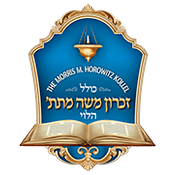Parshas Matos-Maasei 1


׳׳וידבר משה אל ראשי המטות לבני ישראל לאמר זה הדבר אשר צוה ד׳׳ במדבר ל:ב
“Moshe spoke to the heads of the camps to / of the Bnei Yisroel saying, this is what Hashem has commanded” Bamidbar 30:2
Rashi explains that we learn from this pasuk that Moshe Rabbeinu was חלק כבוד לנשיאים by teaching them first, and only afterwards continuing to teach the rest of Bnei Yisroel. Rashi continues to explain that it was in this same order that Moshe gave over all of the commandments to the nation, and the reason why the pasuk mentions this fact specifically over here is to teach us that התרת נדרים (the annulment of vows) is done by a יחיד מומחה . The Ramban argues on Rashi as he explains that this Parsha was taught specifically to the נשיאים , the חכמי ישראל , because these חוקים needed to remain hidden from the simple folk so that they would not act carelessly with regard to נדרים . The Ramban continues to further his point by explaining that התרת נדרים is a הלכה למשה מסיני that was given over ברמיזה (in code) within the secrets of the Torah so that only someone who is worthy will be able to discern it’s pertaining laws. The מאור ושמש adds like the Ramban that only someone who meets great requirements has the right to utter a שבועה and so fittingly, Moshe gave over this Parsha of נדרים ושבועות (vows and oaths) exclusively to the נשיאים.
The אור החיים הקדוש brings out the מהלך of the Ramban in beautiful fashion. He explains that Hashem did not wish to write an open pasuk describing התר נדרים (the annulment of vows), so that we do not degrade the severity of a נדר . That’s why only the חכמים who can understand the different nuances within the דינים of התר נדרים were made privy. But in front of the masses this door of התר נדרים remains locked and they are to follow the directive of the pasuk ׳׳לא יחל דברו ככל היצא מפיו יעשה׳׳ . This is why the pasuk states that Moshe taught these דינים exclusively to the ראשי המטות who were the גדולי ישראל and were able to hear the complete commandment. But to the rest of Bnei Yisroel, Moshe said ,׳׳זה הדבר׳׳ they did not hear the full commandment as did the ראשי המטות , rather ׳׳זה הדבר׳׳ this is the LAW, and they were unaware of the היתר which was ׳׳פורח באוויר׳׳ (see 50 ממעמקי הים גליון מס׳ ), said over באל פה to the ראשי המטות.
However we learn the pasuk, the severity of נדרים ושבועות remains utmost. One must not violate his word and therefore we must weight our thoughts carefully before speaking them aloud. Especially in this period of time known as בין המצרים , the Three Weeks, as we mourn the חורבן (destruction of the Beis Hamikdash) which as we know was destroyed due to שנאת חינם or lack of sensitivity towards our fellow איד. This includes לשון הרע , slander, and all types of pejorative towards our peers. This timely Parsha of נדרים teaches us how careful we must be to guard our tongues from evil speech and think before we talk. Our speech wields tremendous power; with it we may build and through it we may חס ושלום destroy.
Moshe Rothenberg / MMHK
